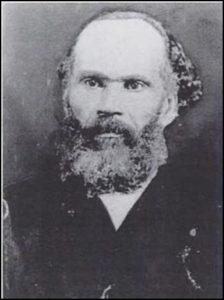
Abraham D. Shadd
*Abraham Schadd was born on this date in 1801. He was a Black abolitionist, businessman, and community organizer.
Abraham Doras Shadd was born in Mill Creek Hundred and was the father of 13 children. The Shadd family represents one of the premier Black families of Delaware. In The Freedom Seekers, Daniel Hill reports that the family descended from Hans Shadd, born in Cassel, Germany, in about 1725. Hans served in Braddock's army in 1755 and ultimately settled in Westchester (now West Chester), Pennsylvania.
Shadd earned a successful living as a shoemaker, a trade he learned from his father. He acquired the property in Wilmington. In 1816, after the American Colonization Society was organized, Abraham Schadd joined with other black leaders, such as William Anderson and Peter Spencer, to organize forces against the "colonization scheme."
In the 1830s, Blacks hosted several national conventions to protest racism and repression. Forty delegates from nine states attended the first Anti-Slavery Society Convention in Philadelphia. Abraham Shadd was the Delaware representative. The primary purpose of the convention was to establish a colony for Blacks in Canada. He and the other leaders saw no need to return to Africa since Africans had aided in building America by "the sweat of their brow." They had as much right to stay in America as other immigrants. In July 1831, the anti-colonization black leaders alerted the black citizens to stay in Delaware until circumstances improved. Schadd was elected president of the National Convention in 1833, indicating his commitment and leadership. As president of that body, he emphasized education, thrift, and hard work to improve the conditions of Blacks.
As an anti-slavery critic, Schadd made his views known and became a subscription agent for William Lloyd Garrison's anti-slavery newspaper, The Liberator. Shadd also served as a delegate to the American Anti-Slavery Society (1835, 1836). In 1836, Shadd lived in West Chester and took "an active role in Underground Railroad activities," working in concert with the local Quakers. In 1851, Schadd, with his 13 children, relocated to North Buxton in Ontario, where he purchased 200 acres of land in a Black communal settlement. He remained an active mason, civic, and community leader, and in 1858 he was elected to the Raleigh Township Commission.
The life Abraham Schadd led became a model for several of his children. His oldest daughter, Mary Ann Shadd, became well-known as an educator, lawyer, and journalist. The Delaware-born heroine attended a Quaker-based school in West Chester, Pennsylvania, and later became an instructor for Black youth in Wilmington. Several other members of the Schadd family excelled: I. D. Schadd served in the Mississippi Legislature from 1871-1874; Abraham W. Shadd was a graduate of Howard Law School; Garrison Schadd became a wealthy farmer, and Emaline Schadd became a professor at Howard University.
By his death in 1882, Abraham Schadd had presented himself as an imposing force against the evils of slavery. He could look back at himself and his work as a Black abolitionist, Underground Railroad supporter, Delaware's delegate to National Negro Conventions, President of the National Convention for the Improvement of Free People of Color, a pioneer in Black settlements in Canada, civic leader, and entrepreneur. His legacy and perseverance were passed on to his family. His deeds and actions for fellow humans entitled him to be ranked among the top Black leaders of the 19th century.
Colin A. Thompson, Blacks in Deep Snow (Don Mills, Ontario: J.M. Dent & Sons, 1979);
Joseph Mensah, Black Canadians (Halifax: Fernwood Publishing, 2002);